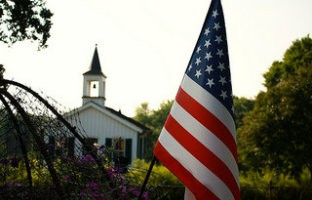Then and Now: A new weekly feature by American religious historians

This new weekly feature, edited by Edward J. Blum, harnesses the expertise of American religious historians who care about the cities of God and the cities of humans. It’s a space where scholarly expertise collides with the faith, hope and love of those of us who seek thoughtful reflection about our pasts to bear upon the confusing issues of our presents.
The past has had a powerful presence this February.
-
- Pope Benedict XVI’s plan to step down turned into a global historical search. “Has a Pope ever resigned?” could be read and heard from Twitter feeds and Facebook status updates to CNN interviews to dinnertime conversations.
-
- More local and from a history particular to the United States, Emory University’s president, James W. Wagner, explained that when difficult compromises had to be made during tense political times, we could look to the Founding Fathers. His key example of a moment when politicians found a “way to temper ideology and continue working toward the highest aspiration they both shared” was the Constitution’s Three-Fifths Compromise, which counted enslaved individuals as three fifths of a person for census, taxation and electoral data.
-
- Wagner wasn’t joking, but Saturday Night Live was when it aired a sketch entitled Djesus Uncrossed. Spoofing the Hollywood hit Django Unchained, the SNL bit showcased Djesus (“the D is silent”) emerging from his tomb to wreak havoc on his enemies. Sword unsheathed, guns blazing, Djesus was out for revenge.
These examples show much more than the power of then in the now: they reveal that as we make meaning of the past, we are continually navigating the ways others understand historical events and how they present them. Although Emory University’s president apologized for his invocation of the Three-Fifths Compromise and later called it “repugnant,” it took an outcry to force him to recognize that his example rubbed even more salt in the wounds of people whose backs and bodies had helped build the nation. Some Christians responded to SNL by calling it blasphemous, while Nihad Awad, executive director of the Council on American-Islamic Relations, denounced it too. Jesus is respected deeply within Islam, Awad explained, and this was another example of presenting messengers of peace as minions of violence.
Not every example is so public or sensational. How often do historical examples come up in sermons, whether they come from Dietrich Bonhoeffer, the Civil Rights movement or films like Argo or Lincoln? How many times do theologians invoke a useable past—people or events from then that inform points of view now?
History and its many interpretations animate our silliest of television programming and punctuate the ideas of our most esteemed universities. They influence our statehouses, our houses of worship and our own houses.
This weekly feature will take today’s public, political and cultural happenings and reflect upon them from various historical vantage points. In response to something like the Pope’s resignation, we might post on key moments in religious traditions when leaders have chosen to leave their positions, like when evangelist Charles Grandison Finney left revival preaching to become president of Oberlin College in 1852. After the Three-Fifths Compromise invocation, we might have highlighted moral responses to it that included everything from abolitionist William Lloyd Garrison calling the Constitution a “covenant with death” and an “agreement with hell” to Glenn Beck and David Barton more recently trying to rehabilitate it. For the SNL sketch, we may have included some reflections on the George Burns and John Denver film Oh, God! (1977) and how differently the sacred beings were represented there.
To use history poorly is to abuse it and the people who still suffer from its burdens. It is also to remain in a darkness of one’s own choosing and making. But history can be helpful. Approached from an effort to honor life and to transform ourselves for the better, history can be a dear friend and informative ally. The point of these weekly entries will be to understand the historical roots of contemporary problems, the roads taken or the avenues neglected in the past, and how thinking responsibly about the past can provide us better information for our spiritual lives today.




